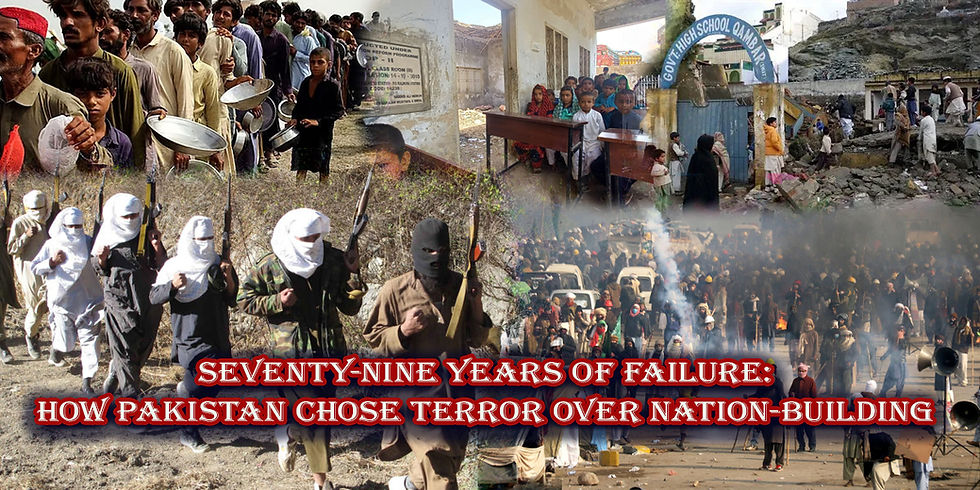SEVENTY-NINE YEARS OF FAILURE: HOW PAKISTAN CHOSE TERROR OVER NATION-BUILDING
- JK Blue

- Aug 14, 2025
- 3 min read

Pakistan marks its Independence Day on 14 August each year, but after seventy-nine years of existence, the promises made at its birth remain largely unfulfilled. Instead of focusing on building a strong, stable and prosperous nation, Pakistan has invested much of its political will, state machinery and national narrative into promoting terrorism, fostering extremism and destabilizing its neighbours. The ideology that was supposed to unite its people under a common cause has been overshadowed by an obsession with hostility, particularly towards India, which has drained resources, crippled development and diverted attention from pressing domestic needs. Pakistan has earned a reputation for being a breeding ground for radical groups and a safe haven for extremist leaders.
One of the clearest indicators of Pakistan’s misplaced priorities is its chronic inability to manage its own provinces, especially Balochistan. Rich in natural resources and strategically important, Balochistan remains one of the most underdeveloped and neglected regions in South Asia. The people there have been deprived of basic rights, education, healthcare and infrastructure for decades. Instead of addressing genuine grievances, the Pakistani state has responded with military crackdowns, enforced disappearances and suppression of dissent. Balochistan is not just an example of poor governance — it is a symbol of how Pakistan has failed to integrate its own citizens into the nation-building process.
Pakistan’s relationships with its neighbours reflect a similar pattern of hostility and mistrust. With India, the obsession over Kashmir has overshadowed every other possible avenue of cooperation or progress. With Afghanistan, Pakistan’s decades-long policy of using militant groups for strategic depth has backfired, bringing instability back into its own borders. With Iran, tensions over sectarian differences and cross-border attacks persist.
Economically, Pakistan is in shambles. Once envisioned as a land of opportunity for Muslims of the subcontinent, it has been struggling under the weight of crippling foreign debt, a weak industrial base, rampant corruption and an economy dependent on aid and loans. The International Monetary Fund (IMF) and friendly nations like China and Saudi Arabia have repeatedly provided lifelines, but these have been temporary fixes rather than long-term solutions. Mismanagement, political instability and a lack of economic vision have left the country unable to stand on its own feet. Inflation is at record highs, unemployment is widespread and the average citizen is struggling to meet basic needs. Instead of investing in education, technology and sustainable industries, the government spends disproportionately on defence, further undermining any prospects for economic recovery.
Internally, Pakistan’s governance has been plagued by instability and corruption. The country has oscillated between military dictatorships and weak civilian governments, with neither able to establish a stable democratic framework. The military’s dominance over political affairs has meant that national priorities often align with security and defence rather than social welfare or development. Political leaders frequently engage in power struggles instead of addressing the needs of the people. Corruption scandals, misuse of public funds and patronage politics have eroded public trust, making it difficult for any reform agenda to take root.
Another critical failure lies in the education and social sectors. Pakistan’s literacy rate is alarmingly low compared to global standards and a significant portion of the population lacks access to quality schooling. In many rural areas, especially in provinces like Sindh and Balochistan, schools are underfunded, teachers are absent and children are forced into labour to support their families. At the same time, extremist madrassas have been allowed to flourish, producing generations influenced by narrow, radical ideologies rather than equipped with the skills to contribute to a modern economy.
Socially, Pakistan has failed to protect its minorities, women and vulnerable communities. Religious intolerance is rampant, with minorities facing discrimination, forced conversions and targeted violence. Laws such as the blasphemy law are often misused to settle personal scores and suppress dissent.
The focus on terrorism as a tool of foreign policy has been particularly destructive. Groups nurtured for strategic purposes have turned against the state, launching deadly attacks within Pakistan itself. The Tehrik-i-Taliban Pakistan (TTP) and other extremist organizations have killed thousands of Pakistani civilians and security personnel. Instead of learning from these tragedies, the state often distinguishes between “good” and “bad” militants, a dangerous policy that has perpetuated the cycle of violence.
After seventy-nine years, Pakistan has just become a country owned by corrupt military Generals, who after retirement don’t settle down in Pakistan. Even the politicians has amassed huge wealth in corruption and let the people of Pakistan suffer since 14 Aug 1947.




Comments